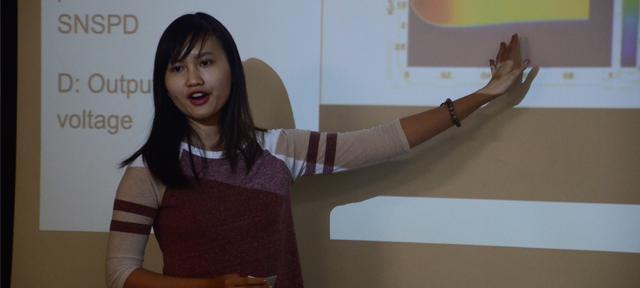Div III Profile: Hampshire’s Phuong Leverages Five Colleges for Advanced Engineering Studies

Lan Phuong “Panda” Nguyen Hoang’s Division III thesis has the potential to stretch from here to the moon with her research focused on superconducting nanowire single-photon detectors (SNSPDs), devices commonly used in vast-space data transfer, quantum computing, and astrophysics. Her undergraduate work, a case study that relied on classes available through the Five College Consortium, has earned her acceptance into a PhD program at the University of California San Diego.
Phuong, a Vietnamese native, explains that when there’s a need for communication over long distances, such as between the moon and Earth, SNSPDs help with efficient data delivery with little power. “It’s challenging for scientists to minimize the required energy to transfer data,” she says. “Utilizing photon transfer is one of the solutions for this problem: it requires very little energy to emit the photons, and those photons can travel a long distance. The SNSPDs can detect when there’s a presence of photons — therefore, data encrypted in the form of photons can be read using this system.”
For her Division III, Phuong simulated an SNSPD using MATLAB, a language of technical computing widely used to solve problems in math and computation, algorithm development, modeling, and simulation. “My project is simulation-based, as I was predicting the outcome of the experiment,” she says. “For someone with no experience in simulation coding, it was challenging to learn the language by myself, and to make the simulation work.”
Phuong says the Five College Consortium was instrumental in her studies. Collaborating with the Radio Frequency Nanoelectronics Group at UMass Amherst, she created a simulation for a modified readout circuitry that helps with faster and more-efficient photon counting. At Mount Holyoke, she worked on a project on quantum dots with Professor Katherine Aidala. In all, throughout her undergrad studies, she took classes at four of the five colleges. She did a substantial portion of her Div III research at UMass working with Joseph Bardin, associate professor of electrical and computer engineering.
“The collaboration among colleges is a major benefit for Hampshire students,” Phuong says. “I had the opportunity not just to create my own curriculum at Hampshire, but also to create it with a good source of classes from all five colleges.”
Bardin served on Phuong’s Division III committee, along with Hampshire’s Herb Bernstein, professor of physics, and Jaime Davila, associate professor of computer science, also at Hampshire. Davila said he admired Phuong’s tenacity in pursuing a difficult subject. “Panda was faced with really hard problems, but she wasn’t sticking to stuff she knew she could handle — she was taking risks,” he said. “She had a clear plan and found spread out across the Five Colleges the resources in faculty doing the work that was of interest to her. That’s a characteristic that points toward success in any field.”
Phuong begins her graduate work this fall, an accomplishment she says wouldn’t be possible without her professors. “I’m so happy and proud I got into the PhD program,” she says. “It’s very much thanks to my committee members, and to all my advisers at Hampshire, UMass, and Mount Holyoke.”



